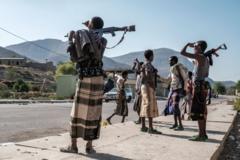The Tigray People's Liberation Front (TPLF) has called for intervention from the African Union following the Ethiopian electoral board's decision to strip the party of its legal status. TPLF officials described the ban as "dangerous," warning it could destabilize the fragile peace reached in 2022 after two years of violent conflict in the Tigray region. The party has been barred from political activities due to its failure to hold a general assembly—a key requirement amid ongoing political tensions. With national elections looming by June 2024, the situation becomes increasingly precarious.
Background to the TPLF reveals its historical significance; it overthrew the government in 1991 and led Ethiopia until Prime Minister Abiy Ahmed's leadership began in 2018. The TPLF previously spearheaded a coalition battling the federal government until a truce was established under the Pretoria peace agreement in November 2022, following horrendous casualties and displacements.
The decision to deregister the TPLF comes at a time when internal splits within the party obstruct it from organizing elections. In response to its ban, the TPLF has reached out to the African Union, advocating for pressure on the Ethiopian government to reconsider its stance. They argue that the ban impedes the rights guaranteed by recent agreements, emphasizing the need for dialogue over militarized conflict.
TPLF deputy chairman Ammanuel Assefa spoke against the electoral board's decision, suggesting it undermines the sacrifices made by countless individuals during the conflict. He highlighted that delays in fulfilling the peace agreement—with over a million displaced individuals still unreturned—heighten the risk of renewed violence, alerting international actors like the US and UK, who have echoed calls for maintaining peace throughout the region.
Background to the TPLF reveals its historical significance; it overthrew the government in 1991 and led Ethiopia until Prime Minister Abiy Ahmed's leadership began in 2018. The TPLF previously spearheaded a coalition battling the federal government until a truce was established under the Pretoria peace agreement in November 2022, following horrendous casualties and displacements.
The decision to deregister the TPLF comes at a time when internal splits within the party obstruct it from organizing elections. In response to its ban, the TPLF has reached out to the African Union, advocating for pressure on the Ethiopian government to reconsider its stance. They argue that the ban impedes the rights guaranteed by recent agreements, emphasizing the need for dialogue over militarized conflict.
TPLF deputy chairman Ammanuel Assefa spoke against the electoral board's decision, suggesting it undermines the sacrifices made by countless individuals during the conflict. He highlighted that delays in fulfilling the peace agreement—with over a million displaced individuals still unreturned—heighten the risk of renewed violence, alerting international actors like the US and UK, who have echoed calls for maintaining peace throughout the region.




















